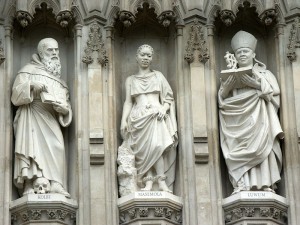Speaking Truth In Season and Out of Season – by Kawuki Mukasa
Theological Reflection – Sunday September 8, 2013
Rev. Can. Kawuki Mukasa, PhD, is the Coordinator for Dialogue at the Anglican Church of Canada in Toronto, ON.

Martyrs in the facade of Westminster Abbey in London, including Archbishop Janan Luwum on the right.
There were those who believed that John the Baptist had come back to life. Others believed that it was Elijah. And others thought that Jesus was a prophet like those of long ago. But Herod said: John, whom I be-headed, has been raised. (Mark 6:14ff)
I have always admired people who, at great risk to their own personal safety, have had the courage to stand tall and speak the truth.
I was a teenager when Idi Amin seized power in my country of birth, Uganda. One of the things I still recall to the present day is the dancing and jubilation in the streets of Kampala when Amin released hundreds of prisoners that the previous regime had locked up for years.
The thing about political prisoners is that relatives and friends at least continue to have hope that they would see their loved ones again some day. But Idi Amin introduced a level of brutality into the country’s political culture that simply shocked everyone. He, literally, took no prisoners. He systematically eliminated his opponents in the most brutal way, intimidating everyone in the country.
But one man, Archbishop Janan Luwum, refused to be intimidated. He condemned the killings every chance he got. He was very loud, very public and very personal in his condemnation. Everywhere he went and every chance he got to speak out he called upon Amin to stop the killings.
Eventually of course the Archbishop himself was silenced. We all expected that his relentless claims on Amin would cost him his life. When it happened few were surprised. But the Archbishop’s death also triggered a series of events that led to the demise of Idi Amin’s regime.
Therein is the point of the gospel: the power in the martyrdom of a prophet. There is something about the killing of a prophet that is transformative. It is true that their lives often end in tragedy. They speak forth God’s word. They confront the powers that be with issues of ethics and justice in a manner that is often offensive and subversive. And so often they are indeed silenced because their message is so disturbing and sometimes even destabilizing. Their lives end in tragedy but it is also often an end that leads to a new awareness, opens up new avenues, brings forth new life and hope.
The gospel story above announces Jesus’ prophetic ministry. Jesus was a prophet in the traditional sense of one who speaks-forth God’s word in ways that may be disturbing, discomforting, embarrassing and subversive. Mark tells the story in a rather interesting way. The point of his message was to say that through his ministry of healing, teaching and preaching Jesus had risen to the level of a prophet. He was having a real impact on communities and even the authorities were beginning to notice.
But then Mark digresses into the grotesque story of John’s execution: the circumstances that led to his be-heading and the impact this action left on Herod’s conscience.
The point that Mark was attempting to make is this: The tragic end of John the Baptist foreshadowed the tragic end of Jesus the Christ. Both men were given to speak-forth God’s word. Both did so in ways that were disturbing to the authorities. Neither backed off their calling because of any concern for their personal safety and in the end both were executed.
However their execution was not the end of the story. Their tragic end instead opened up new channels for accessing God’s grace. It brought forth new waves of God’s blessings and brought us all into a new universal relationship with God.
The gospel story impresses upon us the gift and burden of prophecy. We too have been called upon to speak-forth God’s word without fear of intimidation or concern for our own personal comfort.
I think it is safe to say that for many of us accepting the calling to speak-forth God’s word may not be a matter of life and death. Nevertheless the burden of prophecy – of speaking out and speaking-forth God’s mind in a culture that has already defined its values – the burden of doing so still weighs on us. Our voices may be a destabilizing force in the culture. Our message may cause friction and tension in the community.
Therein lies the risk for us. We may be ostracized, we may be maligned and abused, we may be ridiculed, lose our jobs, friends and relatives. In the end though, all these things notwithstanding, the courage to speak will bear fruit. It will free captives, give voice to the voiceless, liberate the oppressed.
The prophetic voice sticks out as sore thumb, challenging already accepted norms and values and always comes across as an abomination to the existing values of the community. But in the end it is the spark that brings new life to the community. May we always be open to the prompting of the Spirit to speak-forth the truth in our cultures, in season and out of season.








